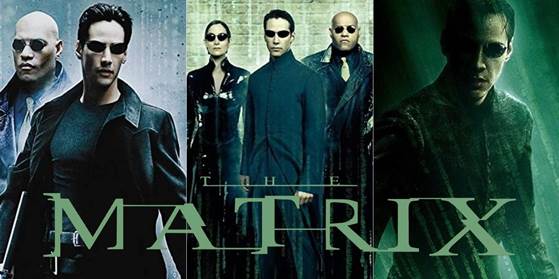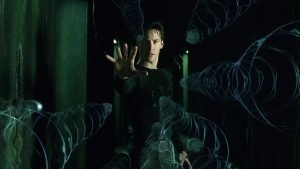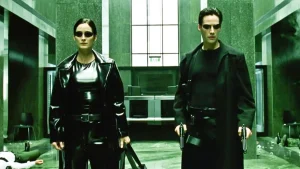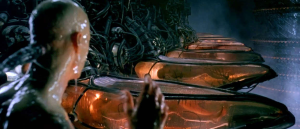“The Matrix (1999)”
- movieslovers
- November 13, 2024

“The Matrix” (1999) is a groundbreaking science fiction film written and directed by Lana and Lilly Wachowski (then known as the Wachowski Brothers). A film that blends action, philosophy, and technology, The Matrix is widely regarded as one of the most influential and revolutionary films in cinematic history. The film is known for its innovative visual effects, particularly the iconic “bullet time” technique, which became a cultural touchstone, as well as its exploration of profound philosophical themes about reality, perception, and human existence.
Plot Summary
The film is set in a dystopian future where humanity is unknowingly trapped inside a simulated reality, called the Matrix, created by intelligent machines to subdue and control humans. The machines harvest human energy to power their existence, while the minds of most humans are plugged into the Matrix, where they live out an artificial life in a simulated world.
Thomas Anderson (Keanu Reeves), a hacker known as Neo, has a nagging sense that something is wrong with the world. He begins seeking answers and is contacted by Morpheus (Laurence Fishburne), a mysterious leader of a group of rebels who are aware of the truth about the Matrix. Morpheus believes that Neo is “The One,” a prophesied figure who has the ability to manipulate the Matrix and free humanity from the machines’ control.
After being taken out of the Matrix, Neo learns that the world he had believed to be real was simply a simulation. He joins Morpheus, Trinity (Carrie-Anne Moss), and the rebel crew to fight against the machines and their enforcers, particularly the Agents, led by the ruthless Agent Smith (Hugo Weaving), whose mission is to destroy Neo and prevent the rebellion.
The film follows Neo’s transformation from a confused, ordinary person to someone who begins to grasp the nature of the Matrix and his own extraordinary potential. The Matrix is a prison for the mind, and only by learning to “bend” the rules of this artificial reality can Neo challenge the machines and fulfill his destiny.
Key Themes
- Reality vs. Perception: One of the central themes of The Matrix is the question of reality. The film explores the idea that what we perceive as reality may not be the true reality, and it asks the audience to question the nature of their own perceptions. The Matrix, as a simulated reality, represents the idea that human beings are trapped by their own limited perceptions, unable to see the truth beyond the illusion.
- Free Will vs. Determinism: Throughout the film, the characters wrestle with the concept of fate. Neo is told that he is “The One” and is destined to free humanity, but he must choose whether to accept his role or forge his own path. The film raises questions about the role of choice in our lives and whether we are truly free or controlled by external forces.
- Humanity and Technology: The Matrix presents a world where machines have gained dominance over humanity, and the film delves into the relationship between humans and technology. It explores the potential dangers of artificial intelligence, as well as the consequences of humans becoming overly reliant on technology.
- Self-Discovery and Enlightenment: Neo’s journey is not just about defeating the machines but also about self-discovery. The film draws on themes of enlightenment, especially in how Neo learns to perceive the world differently and gain control over the Matrix. This journey is symbolized by the transition from ignorance to knowledge, and by the idea of waking up from the “dream” of the Matrix to understand the truth.
- The Hero’s Journey: Neo’s character arc mirrors the classic “Hero’s Journey” found in mythology and storytelling. He starts as an ordinary person, is called to adventure, faces trials, learns important lessons, and ultimately fulfills his destiny. The film heavily references religious and mythological themes, with Neo seen as a Christ-like figure who must sacrifice for the greater good.
Character Development and Performances
- Neo / Thomas Anderson (Keanu Reeves): Neo’s transformation is at the heart of the film. He starts off as a confused, disillusioned individual who is “the one who is meant to be unplugged” from the Matrix. Keanu Reeves’ performance captures Neo’s gradual growth into a powerful figure who can manipulate the Matrix’s rules, culminating in his self-realization and acceptance of his role as the savior of humanity.
- Morpheus (Laurence Fishburne): Morpheus is the wise and enigmatic mentor who believes wholeheartedly in the prophecy of “The One” and sees potential in Neo. Laurence Fishburne brings gravitas and depth to the role, portraying Morpheus as a leader full of conviction, wisdom, and a sense of purpose. His belief in Neo is unshakeable, and he is willing to sacrifice everything to help Neo realize his potential.
- Trinity (Carrie-Anne Moss): Trinity is a strong, capable fighter and hacker, and her relationship with Neo is central to the film. Carrie-Anne Moss brings both toughness and vulnerability to her role, and she plays a crucial part in Neo’s journey. She is not only a love interest but also an essential ally who helps guide Neo through the physical and emotional challenges he faces.
- Agent Smith (Hugo Weaving): Agent Smith is one of cinema’s most iconic villains. As an Agent within the Matrix, Smith is programmed to maintain order, but he becomes increasingly disillusioned with his role and the artificial world he inhabits. Hugo Weaving’s performance as Smith is chilling and full of malice, making him a perfect foil for Neo. Smith’s philosophical rants about humanity and his disdain for the Matrix make him a deeply complex antagonist.

Visual Effects and Cinematography
The Matrix is known for its groundbreaking special effects, particularly the bullet time technique, which allows the camera to move around a scene in slow motion while the action continues at normal speed. This visual innovation became a cultural phenomenon, influencing countless films and commercials after its release. The film’s use of practical effects and CGI to depict the Matrix’s surreal world, as well as the intense action scenes, was revolutionary at the time.
The cinematography, handled by Bill Pope, enhances the film’s themes of duality and perception. The use of green tint in scenes within the Matrix creates a visual distinction between the real world and the simulated one. The dark, sleek aesthetic of the Matrix, with its towering buildings and futuristic cityscapes, contrasts sharply with the more grounded, gritty world outside the simulation.
Soundtrack and Music
The film’s soundtrack, composed by Don Davis, features a score that blends orchestral music with electronic elements, enhancing the futuristic, cyberpunk feel of the film. The music complements the film’s themes of technology, control, and rebellion. The soundtrack also includes iconic songs such as “Spybreak!” by Propellerheads, which is used during the thrilling lobby shootout scene, and “Wake Up” by Rage Against the Machine, which plays over the final credits, perfectly capturing the film’s rebellious tone.
Reception and Legacy
Upon its release, The Matrix was met with widespread critical acclaim for its innovative storytelling, visual effects, and philosophical depth. It was a major box office success, grossing over $460 million worldwide, and won four Academy Awards for Best Film Editing, Best Sound, Best Visual Effects, and Best Sound Effects Editing. The film also earned numerous other accolades and has since become a cultural touchstone.
The Matrix is often regarded as one of the most influential films in the science fiction genre, inspiring countless works in film, television, and video games. Its exploration of virtual reality, artificial intelligence, and the nature of human existence continues to resonate with audiences and filmmakers alike.
Cast and Crew
- Director: Lana and Lilly Wachowski
- Writers: Lana and Lilly Wachowski
- Cast:
- Keanu Reeves as Neo / Thomas Anderson
- Laurence Fishburne as Morpheus
- Carrie-Anne Moss as Trinity
- Hugo Weaving as Agent Smith
- Joe Pantoliano as Cypher
- Gloria Foster as The Oracle
- Marcus Chong as Tank

Fun Facts
- Influences: The film is heavily influenced by a variety of sources, including cyberpunk literature (such as William Gibson’s Neuromancer), martial arts films (notably The Matrix’s fight choreography), and philosophical concepts from thinkers like Plato and Descartes, particularly in the exploration of perception and reality.
- Training for the Role: Keanu Reeves underwent months of martial arts training to prepare for the film’s intense fight sequences, learning kung fu and other combat techniques.
Conclusion
The Matrix is a revolutionary film that changed the landscape of modern science fiction cinema. With its groundbreaking visual effects, deep philosophical themes, and unforgettable performances, the film became a cultural phenomenon. Its exploration of artificial intelligence, reality, and human perception continues to inspire filmmakers and thinkers, ensuring its place as one of the most influential films of the 20th century. The franchise continued with two sequels, but The Matrix remains an iconic and timeless film that continues to captivate audiences worldwide.











